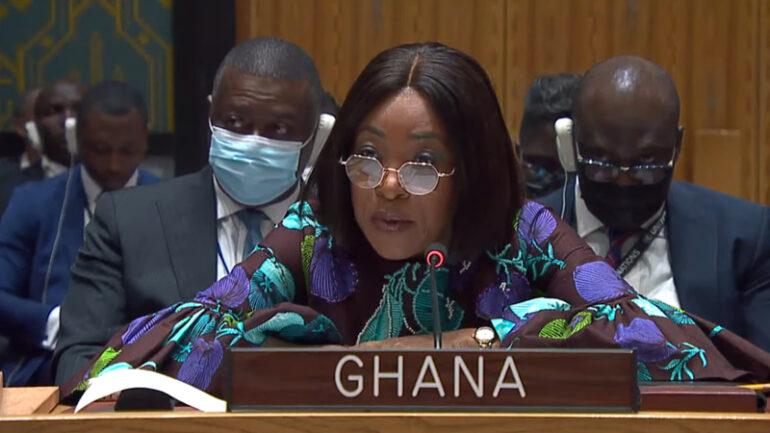United Nations Security Council Meeting on Armed Conflict and Food Insecurity

- Posted by admin
- Posted in Statement & Remarks, UNSC
Mr. President, Secretary of State Antony Blinken, I would like to thank you and the US delegation for highlighting the very important subject of armed conflict and food insecurity during your Presidency of the Council. I also thank Secretary-General Antonio Guterres, WFP Executive Director David Beasley, FAO Director-General Qu Dongyu and Founder and CEO of Gro Intelligence, Sara Menker for their briefing. We appreciate their useful perspectives on armed conflict and food insecurity.
Mr. President,
This Council is no stranger to the harrowing reports of starvation and other forms of food insecurity caused by conflict in different parts of the world. Millions of people, especially children, have suffered or perished from food insecurity in the challenging periods of conflict that my own continent has had to endure, especially over the past three decades. The food systems of those countries in conflict usually mcollapse, with huge consequences for the economy, livelihoods and living standards. Those impacts were localized and those of us who lived outside the
theatre of war were involved only inasmuch as our conscience compelled us to act, including taking in refugees or by intervention, through peace support operations. Today, however, perhaps the first time since the Second World War, we see the impact of one conflict on food security in every country, every home and on everyone. We experience together the profound anxiety of a global economy in uncharted waters, buffeted by uncertain headwinds.
It is in this context that Ghana welcomes the important contribution that resolution 2417 makes in acknowledging the interlinkages between conflict and hunger. There is still much left to be done to build resilience in food systems and enhance global respect for norms relating to a populations’ right to food, regardless of the state of conflict; and to integrate peace-building objectives into the creation of resilient food systems, with a backward interlock of food security objectives into peace-building programmes and activities.
Mr. President,
As we mark the fourth anniversary of the Council’s adoption of resolution 2417 this month, unfolding global events continue to be a rude and painful reminder of the debilitating linkages between armed conflict, hunger and food
security. Though the current global food insecurity crisis predates Russia’s invasion of Ukraine, the war has clearly exposed the interconnected nature and fragility of global food systems, with serious consequences for global food and nutrition security, particularly for vulnerable countries and populations.
The food crisis that millions of the world’s citizens confront now, especially in Africa, which is the hardest hit, cannot wait until we have a perfect outcome among all States. What is needed are purposeful actions that support efforts of developing countries, such as the African Common Position for Sustainable Food Systems. Those actions must focus on building resilience in economies and food systems. The scale and effectiveness of the efforts of the IMF and the World Bank in filling the financing gap in Africa in response to the COVID-19 pandemic through fast track facilities, contingency emergency financing as well as the IMF ’s issue of Special Drawing Rights, among others, provide a model for addressing short term shortages and building resilience. It also requires action by the parties to the conflict to facilitate the movement of food and fertilizers through Black Sea ports and other transportation lanes and we call on those, in a position to do so, to act in the interest of international
cooperation and the values of our United Nations.
We are encouraged by the role that global humanitarian hubs such as the International Humanitarian City in Dubai and regional humanitarian hubs like the one in Accra can play in interconnecting humanitarian needs with food availability. The international humanitarian community must deepen their national and regional coordination mechanisms for programming and responding to humanitarian crises and align their interventions with national and regional response plans. Additionally, major donors must cooperate to shift funds out of separate silos to enable integrative work, and also in a manner that does not prioritize food distribution to vulnerable communities over the sustainable approach of helping them to reconstruct their food systems.
In concluding, I would like to stress Ghana’s readiness to join any effort aimed at removing export restrictions on excess grains; to bring on-stream grains in parts of Eastern Europe, where the present conflict is raging; a reactivation of global maritime transport, with a priority on food supply; and to ensure that those countries that are experiencing the perfect storm of pandemic and war have the required credit to purchase grains and food supply. We must do all in our power to prevent starvation and death, anywhere, and to restore economic and financial
stability for the sake of all our peoples.
I thank you for your attention.
